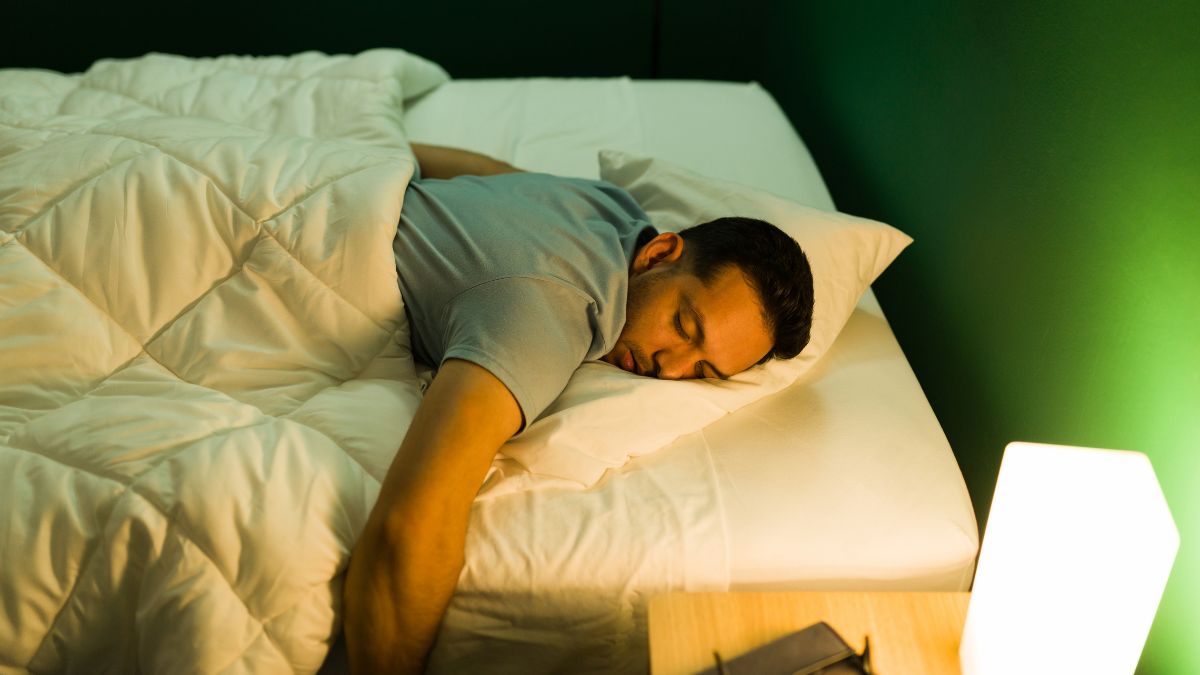It was 3 AM, and I found myself staring at my bedroom ceiling again, mind racing and feeling wired despite being completely exhausted.
As someone with ADHD, sleepless nights weren’t new to me. But what I didn’t realize then was how my breathing patterns were silently amplifying both my sleep issues and ADHD symptoms.
During an ADHD coaching session, my client mentioned something that stopped me in my tracks: “My son’s ADHD symptoms improved dramatically after his sleep apnea treatment.”
This comment sparked a journey down a fascinating rabbit hole of research about the interconnection between breathing patterns, sleep quality and ADHD.
The Triangle of Nervous System Dysegulation:
I’ve previously written about the importance of nervous system regulation for managing ADHD symptoms so you can consistently feel and perform your best.
But all the hard work to reduce stress and heal your nervous system can be easily undermined by mouth breathing and sleep apnea while you are asleep (often without you having anyone awareness of it).
What I discovered from my challenges with poor quality sleep was a complex relationship between three factors that many of us with ADHD might not connect:
1. Mouth Breathing:
Many of us are chronic mouth breathers without realizing it. I certainly was. Whether during sleep or daily activities, breathing through the mouth instead of the nose can lead to:
- Reduced oxygen efficiency
- Altered facial development
- Increased likelihood of sleep-disordered breathing
2. Sleep Apnea:
This condition, where breathing repeatedly stops and starts during sleep, is significantly more common in people with ADHD. The kicker? Many cases go undiagnosed because we attribute the symptoms to ADHD itself:
- Daytime fatigue
- Difficulty concentrating
- Irritability
- Memory problems
3. Nervous System Dysregulation:
Poor sleep quality from mouth breathing and sleep apnea can mimic or worsen ADHD symptoms, creating a challenging cycle to break. This amplifies the nervous system dysregulation that worsens the biggest challenges with ADHD:
- Inattention
- Hyperactivity
- Impulsivity
- Fatigue
The Science Behind The ADHD Mouth Breathing Connection
Research has shown that sleep-disordered breathing can affect the same areas of the brain involved in ADHD, particularly the prefrontal cortex. This region is crucial for:
- Executive function
- Attention regulation
- Impulse control
Research has found that the prefrontal cortex tends to be under-active in people with ADHD but poor quality sleep can significantly amplifies this deficit.
When we don’t breathe properly during sleep, key areas of the brain like the prefrontal cortex don’t get the oxygen and rest they need to function optimally during the day.
If you have ADHD, I’m sure you’ll well aware of how much poor sleep impacts your ADHD symptoms. According to the National Sleep Foundation, ADHD is associated with a variety of sleep problems and disordered mouth breathing can massively amplify these problems.
Shockingly, a research study has found that “children with breathing problems like snoring, mouth breathing or sleep apnea are 40–100 times more likely to develop behavioral problems resembling ADHD.”
Breaking The Poor Sleep Cycle: My Personal Journey
After recognizing these connections, I made several changes:
1. Conscious Nasal Breathing
I started practicing nasal breathing exercises during the day and used mouth taping at night (under medical supervision). The first few nights were challenging, but the improvement in my sleep quality was noticeable within a week.
2. Sleep Position Modification
I elevated my head slightly and started sleeping on my side, which helped reduce both mouth breathing and apnea episodes.
3. Professional Sleep Evaluation
I got a proper sleep study done. While my case wasn’t severe enough for a CPAP machine, the insights helped me understand my breathing patterns better.
Side Note: There’s a new generation of sleep wearables that are starting to be able to accurately identify sleep apnea and sleep-disordered breathing with the Ringconn 2 being notable as it can help you connect daily activities and mindless vices to increases in apnea events each night.
What This Means For The ADHD Community
As both someone with ADHD and a coach, I’ve come to believe that addressing breathing patterns should be part of our broader ADHD management strategy. Here’s why:
- Many ADHD medications can affect sleep quality, making proper breathing even more crucial
- Improved sleep quality can enhance medication effectiveness
- Better breathing patterns can help regulate the nervous system, reducing anxiety and improving focus
Action Steps for Readers
If this resonates with you, here’s what you might want to consider:
1. Self-Assessment
- Do you wake up with a dry mouth?
- Do you snore or grind your teeth at night?
- Do you feel unrested despite sleeping enough hours?
2. Professional Consultation
- Talk to your ADHD healthcare provider about sleep quality
- Consider a sleep study
- Consult with a breathing specialist or ENT doctor
3. Simple Starting Points
- Practice conscious nasal breathing during the day
- Try breathing exercises before bed
- Consider sleep position modifications
One last thing I think can also have a huge impact: never using your smartphone in your bedroom. Reduced exposure to blue light from screens close to bedtime has been shown to improve sleep quality.
The absolute worst thing you can do for sleep quality is scroll on your phone in the darkness of your bedroom at night.
A Note of Hope
Understanding this connection has been transformative for both my personal ADHD management and my coaching practice because now I include breathwork practices for reducing mouth breathing and shallow breathing
While it’s not a cure-all, addressing breathing patterns can be a powerful piece of the ADHD management puzzle.
Remember, everyone’s experience with ADHD is unique, and what works for one person may not work for another. However, the fundamental connection between breathing, sleep, and brain function is universal.
By addressing these basic physiological needs, you may find yourself better equipped to handle the challenges of ADHD.
Have you noticed any connections between your breathing patterns and ADHD symptoms? I’d love to hear your experiences in the comments below.
- 10 Tips, Tricks And Tools To Overcome ADHD Paralysis - March 19, 2025
- 10 Interesting Facts About Adult ADHD And Mental Health - March 18, 2025
- 15 Ways To Manage ADHD Without Meds By Biohacking Dopamine - February 14, 2025




